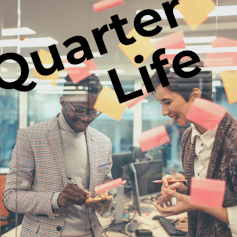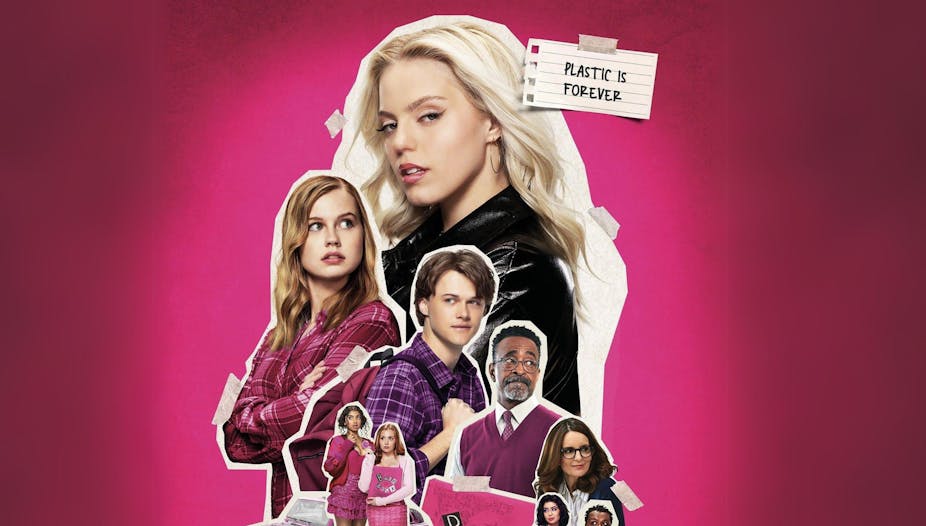The 2004 teen film Mean Girls has become part of the fabric of contemporary popular culture. Fans are able to enjoy quote-along screenings and take online quizzes to find out which member of the Plastics their personality most resembles, and 3 October is even now known as Mean Girls day.
The new musical version – an adaptation of the 2017 stage musical – aims to ensure that fans of the original are kept happy. It sticks closely to the same plot and retains the same iconic moments and quotable lines.
The film follows naive, formerly home-schooled new girl Cady (Angourie Rice) as she navigates the social hierarchies of high school. Encouraged by her new friends Janice (Auli‘I Cravalho) and Damian (Jaquel Spivey), Cady infiltrates the clique at the top of the social order, known as “the plastics”, as part of a scheme to sabotage “queen bee” Regina George (Renee Rapp).

This article is part of Quarter Life, a series about issues affecting those of us in our twenties and thirties. From the challenges of beginning a career and taking care of our mental health, to the excitement of starting a family, adopting a pet or just making friends as an adult. The articles in this series explore the questions and bring answers as we navigate this turbulent period of life.
You may be interested in:
Selling on Vinted, Etsy or eBay? Here’s what you need to know about paying tax
Four ways men and women can improve their health before trying to conceive
The Mean Girls musical isn’t the first teen film to follow the film-to-stage-musical-to-film-musical trajectory. Hairspray, for example, followed the same 20-year-ish route (with a film in 1988, stage musical in 2002 and film musical in 2007).
As someone who has been thinking, teaching, and writing about teen films – with Mean Girls (2004) as a key text – for the last 20 years, I really wanted to like this film. Unfortunately as a pastiche of a film that was already a pastiche, this musical is a copy too far.
Why a pastiche of a pastiche doesn’t work
From its opening moments, the original Mean Girls film is postmodern and reflexive, with lines like: “And on the third day God created the Remington Bolt Action Rifle so that man could fight the dinosaurs … and the homosexuals.”
The film’s excessive self-awareness signals a rejection of the sincerity and sentimentality often attributed to teen films. Especially clean teen films such as Gidget (1959) or John Hughes films like Sixteen Candles (1984).
Mean Girls is a pastiche, not a parody. Where parodies makes fun of the subjects they imitate as a means to undermine the original, pastiches make fun with imitation in ways that leave the original unquestioned. Pastiche is a hyper-imitation that signals itself as such, but enables an experience of the pleasures of the imitated work all the same.
In the 2004 Mean Girls, this imitation is highly self conscious and central to the film’s comedy. In the winter talent show scene, for example, the plastics perform a dance routine to Jingle Bell Rock. When the CD player is accidentally kicked off stage and the prerecorded music stops, they freeze mid-performance.
In a pastiche of traditional musical spontaneity, authenticity and musical contagion – in which bystanders in the world of the musical are overcome by the music and cannot help but tap their feet or sing along – the plastics finish the routine acapella. The audience in the film’s school auditorium seem almost possessed as they join in and sing along.
The fun of this type of pastiche is that we get to experience the pleasures of the thing that is being imitated, alongside the pleasures of self awareness. As I have argued in my research, while the scene self consciously winks with its knowingness of musical conventions, we get to enjoy a version of the sense of energy and togetherness that this kind of musical moment evokes nonetheless.
Because the new film itself is a traditional musical, the winter talent show scene in the 2024 musical film cannot have fun with those conventions in the same way. The film aims to utilise in earnest those techniques that the original uses to make fun with.
Now danced to a song called Rocking around the Pole, the talent show number is no longer a pastiche of the musical genre, but an imitation of the scene in the original Mean Girls film.
As a double copy, the residual pleasures – the feelings of community and togetherness that the original offers – are lost. All we are left with is that knowing wink. On its own, this knowingness just isn’t that much fun.
The new film does involve some enjoyable nostalgia, including a fun unexpected cameo. There are excellent performances from the young cast and the fact that Renee Rapp plays Regina George as queer adds its own fun.
But if you’re looking for a teen film that hits the fun and funny notes of the original Mean Girls film, as well as offering an authentically queer take on girlhood, I recommend watching Booksmart (2019) or Bottoms instead (2023).

Looking for something good? Cut through the noise with a carefully curated selection of the latest releases, live events and exhibitions, straight to your inbox every fortnight, on Fridays. Sign up here.

